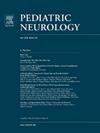儿童夏皮罗综合征14例新病例
IF 2.1
3区 医学
Q2 CLINICAL NEUROLOGY
引用次数: 0
摘要
自发性周期性低体温症(SPH),又称夏皮罗综合征,是一种罕见的以自发性低体温发作为特征的综合征。SPH的诊断基于临床特征;没有具体的仪器测试,也没有商定的诊断标准。SPH的发病机制尚不清楚,从治疗的角度来看,意见不一。迄今为止,文献报道的病例很少,其中只有30例是儿科病例。我们的目标是通过报告14例新病例,包括6例阳性家族史,扩大目前对儿科发病SPH的认识。结果:在我们的病例系列中,所有患者均出现阵发性低体温发作,71%的患者在发作时伴有多汗症,随后出现其他临床症状,如苍白(86%)、嗜睡(57%)或虚弱(57%)。4名患者进行了全外显子组测序,以评估可能参与SPH发病机制的遗传变异的存在,结果为阴性。结论sph是一种罕见的疾病,仍然是一种排除性诊断,必须怀疑出现阵发性低体温发作的患者,否则无法解释,伴有或不伴有多汗症。我们的许多家族病例支持SPH发病机制中存在遗传成分;需要进一步的研究来更好地了解这种情况及其潜在机制,并建立更有效的诊断和治疗策略。本文章由计算机程序翻译,如有差异,请以英文原文为准。
Fourteen New Pediatric Cases of Shapiro Syndrome
Background
Spontaneous periodic hypothermia (SPH), also known as Shapiro syndrome, is a rare syndrome characterized by paroxysmal episodes of spontaneous hypothermia. The diagnosis of SPH is based on clinical features; there are no specific instrumental tests and no agreed diagnostic criteria. The pathogenetic mechanisms underlying SPH are unclear, and from the therapeutic point of view opinions are divergent. To date, very few cases have been reported in the literature and among these only 30 are pediatric cases. We aim to expand the current knowledge of pediatric-onset SPH by reporting 14 novel cases, including six with a positive family history.
Results
All patients in our case series present with paroxysmal episodes of hypothermia, associated in 71% of cases with hyperhidrosis at the onset of the episodes and later with other clinical signs such as pallor (86%), sleepiness (57%), or asthenia (57%). Four patients underwent whole exome sequencing to evaluate the presence of genetic variants potentially involved in the pathogenesis of SPH, which yielded negative results.
Conclusions
SPH is a rare condition and remains a diagnosis of exclusion, which must be suspected in patients presenting with paroxysmal episodes of otherwise unexplained hypothermia, with or without hyperhidrosis. Our numerous familial cases support the presence of a genetic component in the pathogenesis of SPH; further research will be needed to better understand the condition and its underlying mechanisms and to establish more effective diagnostic and treatment strategies.
求助全文
通过发布文献求助,成功后即可免费获取论文全文。
去求助
来源期刊

Pediatric neurology
医学-临床神经学
CiteScore
4.80
自引率
2.60%
发文量
176
审稿时长
78 days
期刊介绍:
Pediatric Neurology publishes timely peer-reviewed clinical and research articles covering all aspects of the developing nervous system.
Pediatric Neurology features up-to-the-minute publication of the latest advances in the diagnosis, management, and treatment of pediatric neurologic disorders. The journal''s editor, E. Steve Roach, in conjunction with the team of Associate Editors, heads an internationally recognized editorial board, ensuring the most authoritative and extensive coverage of the field. Among the topics covered are: epilepsy, mitochondrial diseases, congenital malformations, chromosomopathies, peripheral neuropathies, perinatal and childhood stroke, cerebral palsy, as well as other diseases affecting the developing nervous system.
 求助内容:
求助内容: 应助结果提醒方式:
应助结果提醒方式:


